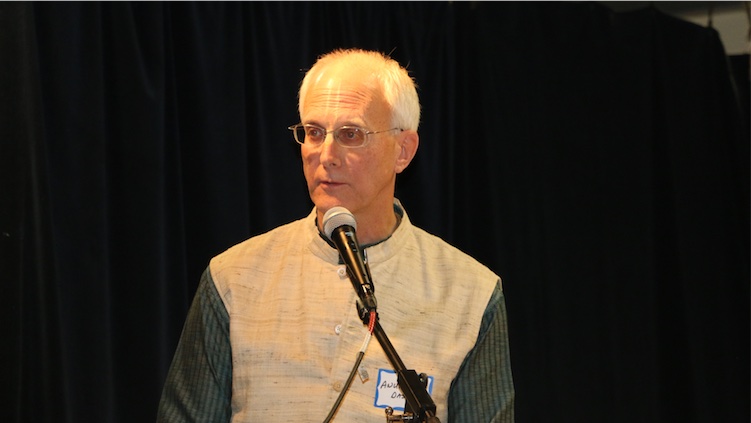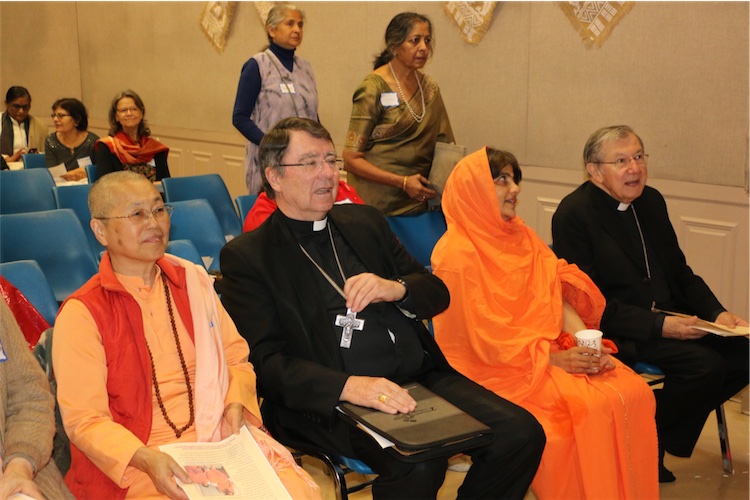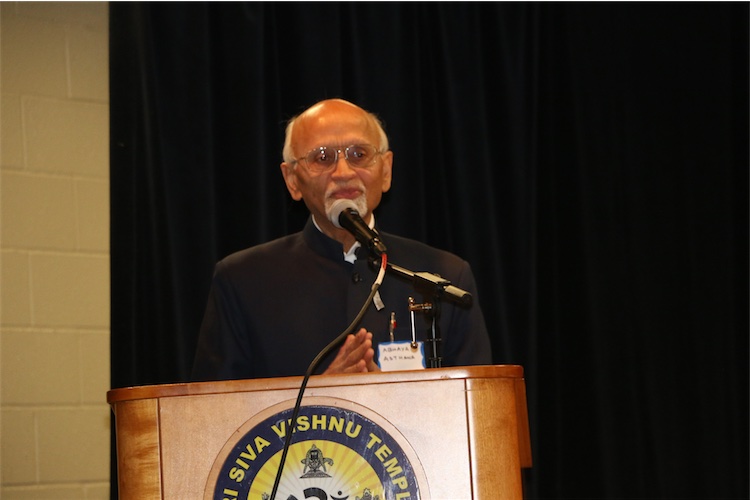Hindu-Catholic Dialogue Discusses Love of God and One’s Neighbor
By Madhava Smullen | Ноя 30, 2017

Around 125 people from both traditions attended the third annual Hindu-Catholic Dialogue, held at the Shiva Vishnu temple in suburban Washington D.C. on Saturday November 11th.
Participants included Catholic bishops, priests and several dozen Catholic laypeople. From the Hindu community, there were leaders from local Hindu temples, along with a number of congregational members. These included about a dozen from the ISKCON temple in Potomac, Maryland; among them ISKCON Communications Director Anuttama Das, one of the founding organizers of the Dialogue.
This year’s discussions shed light on the topic “Love of Neighbor in the Catholic and Hindu Traditions: Reflections on Nationalism, War and Poverty.”
Beginning the Dialogue via a pre-recorded video speech was Congresswoman Tulsi Gabbard from Hawaii, who describes herself as a “Vaishnava Hindu.”
“If we truly want to “love our neighbor” and solve the problems of nationalism, war, and poverty, it’s going to take each of us cultivating our love for God and others,” she said.
“Jesus’ first and foremost commandment, to love the Father with all our heart, mind, and being, is identical to Krishna’s message in the Bhagavad-Gita, Ch.18, Verse 66,” she added. “Krishna, which literally means “the All-Attractive” Supreme Lord, tells Arjuna, his dear friend, “Abandon all varieties of religion, and just surrender unto Me.” In other words, Krishna is saying put aside your fears, your concerns about salvation, your worries about going to heaven, the thoughts of practicing mystic yoga or silent meditation, and simply take shelter in Me. He’s saying love Me and take shelter in My love for you.”
“The more we grow in our love for God,” Tulsi said, “The more we will love others, regardless of their nationality, their race, their religion, or any other differences that we might have with them.”
She explained that loving our neighbors in this God conscious way will result in seeing war as a last resort for solving problems, and in a natural inclination to help others. She also expressed that according to both Christian and Hindu scriptures, we cannot cultivate our love for God independently of caring for other living beings.
In his keynote speech that followed, Archbishop Christophe Pierre, Vatican Ambassador to the United States, began by explaining the Catholic teaching regarding respect for human life.
Catholic Social Doctrine, he said, rests upon the inherent dignity of the human person. “This idea of dignity, rooted in human nature,” he expounded, “Is a philosophical and legal concept that can provide a foundation for fundamental rights and for dialogue among people of different faiths.”

Arcbhishop Christoph Pierre (center, with cross) sits next to Swamini Svatmavidyananda (lady in orange) at the Dialogue
Aligning with Congresswoman Gabbard’s points, he said “[In Christian doctrine] Love of God and love of neighbor become one. The Christian scriptures state: ‘If anyone says, ‘I love God’ and hates his brother, he is a liar; for he who does not love his brother whom he has seen, cannot love the God whom he has not seen.’ ”
The Archbishop also spoke against war, citing the commandments ‘You shall not kill’ and ‘You shall love your neighbor as yourself.’
In his conclusion, the Archbishop perfectly synthesized the Catholic approach: “In loving one’s neighbor, Christians believe they are also loving God, who made man and woman in his image and likeness,” he said. “The fundamental nature and dignity that we share unite humanity in solidarity, fraternity, and concern for one another as we search for paths to peace, understanding and mutual respect.”
Swamini Svatmavidyananda, a professor at the Graduate Theological Union in Berkely, California, gave a second keynote address. In it, she said that the Christian tradition of “love one’s neighbor as oneself” has parallels in the Vedic injunctions to receive a guest as one would receive God.
Discussing war, she said, “The Vedas encourage the practice of ahimsa, in all transactions before considering the use of arms. For instance, the terrible battle of Kurukshetra, detailed in the Mahabharata was a last resort after all diplomacy failed.”
In talking about poverty, the Swamini said that it is due to overconsumption of Mother Earth’s resources, and that the Hindu tradition teaches a spiritual ecology of partnership with, and mutual respect for, all things in the environment.
She also said that much like Catholics, Hindus are encouraged to share their wealth with the less fortunate. “We believe that if one is fortunate enough to be in a comfortable position, it is due to the grace of God, and therefore, really speaking, one cannot claim ownership of anything in this universe,” she said, citing the Bhagavad-gita.
Next, three speakers responded to the keynote addresses.
In his response, ISKCON’s Anuttama Das said he felt that dialogue should not just be for learning about each other, but also for learning from each other.
He expressed appreciation for Catholics’ belief in the dignity of life and how they sacrifice their own comfort to serve others with incredible networks of hospitals, schools and charities.
“These works challenge us as Hindus to live up to what we teach,” he said. “We talk a lot about sacrifice, but do we really extend ourselves sufficiently?”
Similarly, he felt that we should learn from each other on the topic of war and violence.
“Looking at all of the violence that exists in the world today, how is it that God allows this to go on?” he said. “Should we not ask ourselves, are we not part of the problem? Does the violence that we sow not seed the wars and the violence in our streets?”

Dr. Abhaya Asthana, President of Vishwa Hindu Parishad of America, speaks
Catholics, he said, are strong advocates in minimizing the violence against unborn children, and we should look at if we are doing enough on right to life issues as Hindus.
“Meanwhile we Hindus are very concerned about the fact that we make war on other species; and we believe that contributes to violence,” he said. “9.2 billion animals are killed for food in the United States alone. Should we not ask our Christian brothers and sisters to examine their lives more carefully? To consider the teaching, ‘As ye sow, so shall ye reap’? And together, are we not being the cause of the violence?”
Next, in his response, Jesuit Father James Redington of the University of Scranton, Pennsylvania, observed that solidarity is a real help for common action in overcoming poverty, making peace, helping refugees, and offsetting climate change.
“If we act together in solidarity, that will deepen and make more effective our work,” he said. “Good Christians should have the courage to tell other Christians who denounce Hinduism that they are demonizing a very good religion. Tolerance is necessary as a minimum. At a middle level is respect for religions other than our own. The highest level is friendship. Aspects of another’s religion can enrich me and my own religion.”
And Dr. Abhaya Asthana, President of Vishwa Hindu Parishad of America (VHPA), said, “These dialogues, over the past two years, continue to bring our communities together with a deeper understanding of each other’s traditions, thoughts and practices. The theme this year is both meaningful and pragmatic.”
After lunch, both Francis X. Clooney, Professor of Divinity at Harvard University, and Dr. Brahmachari Sharan, Hindu Chaplain at Georgetown University, spoke on the future of U.S. Catholic and Hindu dialogue.
It is hoped that the Dialogue will become an annual event, and that more young people will become involved, introducing a youth panel.
The event concluded with devotees giving out seventy-five paperback copies of Bhagavad-gita As It Is, fifty hardback Bhagavad-gitas, and one hundred copies of ISKCON’s 50th anniversary magazine as gifts to participants.
“I think going to these dialogues is important for broadening our horizons and becoming more educated about other people’s faiths,” says ISKCON Communications assistant director Amrita Hari Dasi.
“They are also a very good way of opening our eyes to things we need to work on – things we are not practicing perfectly according to our own faith.
“And finally, in ISKCON we can get very entrenched in our own internal issues. But if we interact with other religions and faith leaders, we can work with them on common world issues we would all like to see solved, and contribute spiritual solutions to those problems together.”















